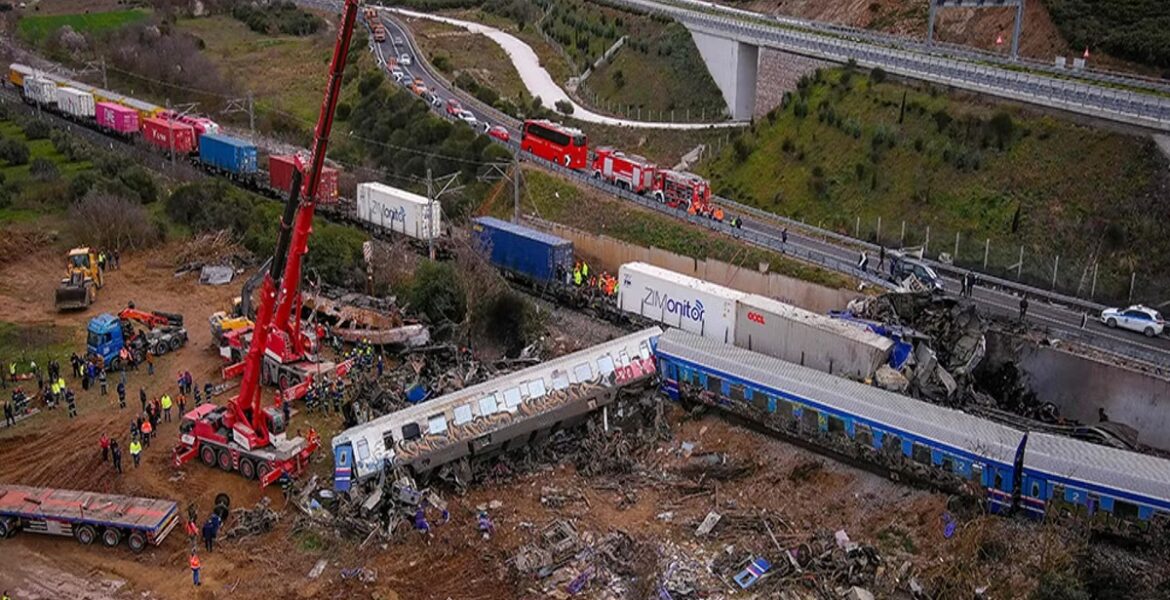The last body found at the Tempi train collision site has been identified as a Syrian man, the Hellenic Police announced on Wednesday.
By using comparative DNA analysis, the police said the body was identified as that of a Syrian national, based on a sample provided by a relative and a personal object of the deceased.
This brings the total number of bodies identified to 56, while the remains of a young woman reported as missing by relatives have not been found.
In a statement, Greek police headquarters said, "A total of 56 victims have been identified, following comparative analysis of 58 DNA samples taken from relatives of the victims or the victims' personal items, as well as of 108 samples taken from bodies or parts of bodies."
The police clarified that "all 108 samples of bodies or body parts correspond to the 56 victims, while there is a single case where the DNA sample taken from a missing woman's relative does not correspond to any of the samples."
They also said that "the laboratory analysis of biological material and the analysis of laboratory results are concluded."
In terms of the Syrian national, the victim was identified through his brother "who was located through a police collaboration with the Netherlands." Greek police then requested the dispatch of DNA samples, which helped identify him.
Tens of thousands of people have rallied in Athens and cities across Greece to demand accountability following the deaths of 57 people last week in the country’s worst train disaster.
Labour unions and student associations organised the demonstrations on Wednesday, while strikes halted ferries to the islands and public transportation services in Athens, where at least 40,000 people took to the streets.
Demonstrators marching to parliament in the centre of the capital waved signs reading, “It’s not an accident, it’s a crime” and “It could have been any of us on that train”. Others chanted “Murderers!” and “We are all in the same carriage.”
Violence briefly broke out when a group of protesters clashed with riot police, who fired tear gas at the crowd. Protesters hurled petrol bombs in front of parliament and set a van and rubbish bins on fire.
More than 20,000 joined rallies in Thessaloniki, Greece’s second-largest city, where clashes broke out when several dozen youths challenged a police cordon. Twelve students from the city’s university were among the dead in last week’s head-on crash between two trains.
Police fired tear gas in the southern city of Patras, where a municipal band earlier played music from a funeral march while leading the demonstration.
In the central city of Larissa, near the scene of the train collision, students holding black balloons chanted “No to profits over our lives!”
The February 28 crash has stirred public outrage over the crumbling state of the Greek rail network, and striking workers have said years of neglect, underinvestment and understaffing – a legacy of Greece’s decade-long debt crisis – were to blame.
Many of the estimated 350 people on board an intercity passenger train that collided head-on with a freight train while travelling on the same track were university students heading to the northern city of Thessaloniki from Athens after a long public holiday weekend.
The disaster has sparked protests across Greece with more than 10,000 people rallying in Athens on Sunday, releasing hundreds of black balloons into the sky.
Rail workers have staged rolling, 24-hour strikes since Thursday, bringing the network to a halt. They say their demands for the improvement of safety protocols have gone unheard for years.
ADEDY, the umbrella union representing hundreds of thousands of public sector workers, has also called for a 24-hour walkout.
“We will impose safe railways so that no one will ever experience the tragic accident at Tempi ever again,” the main railway workers’ union said in a statement.
“We have an obligation towards our fellow humans and our colleagues who were lost in the tragic accident.”
Other transport workers went on strike in solidarity, disrupting metro, tram and bus services in the capital, Athens. Ships also remained docked at ports as seamen participated in the labour action.
READ MORE: Strikes all across Greece on Wednesday - See photos.

